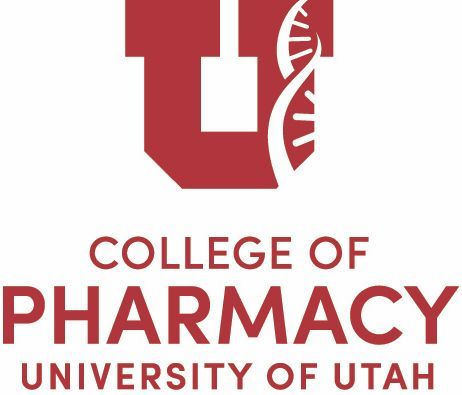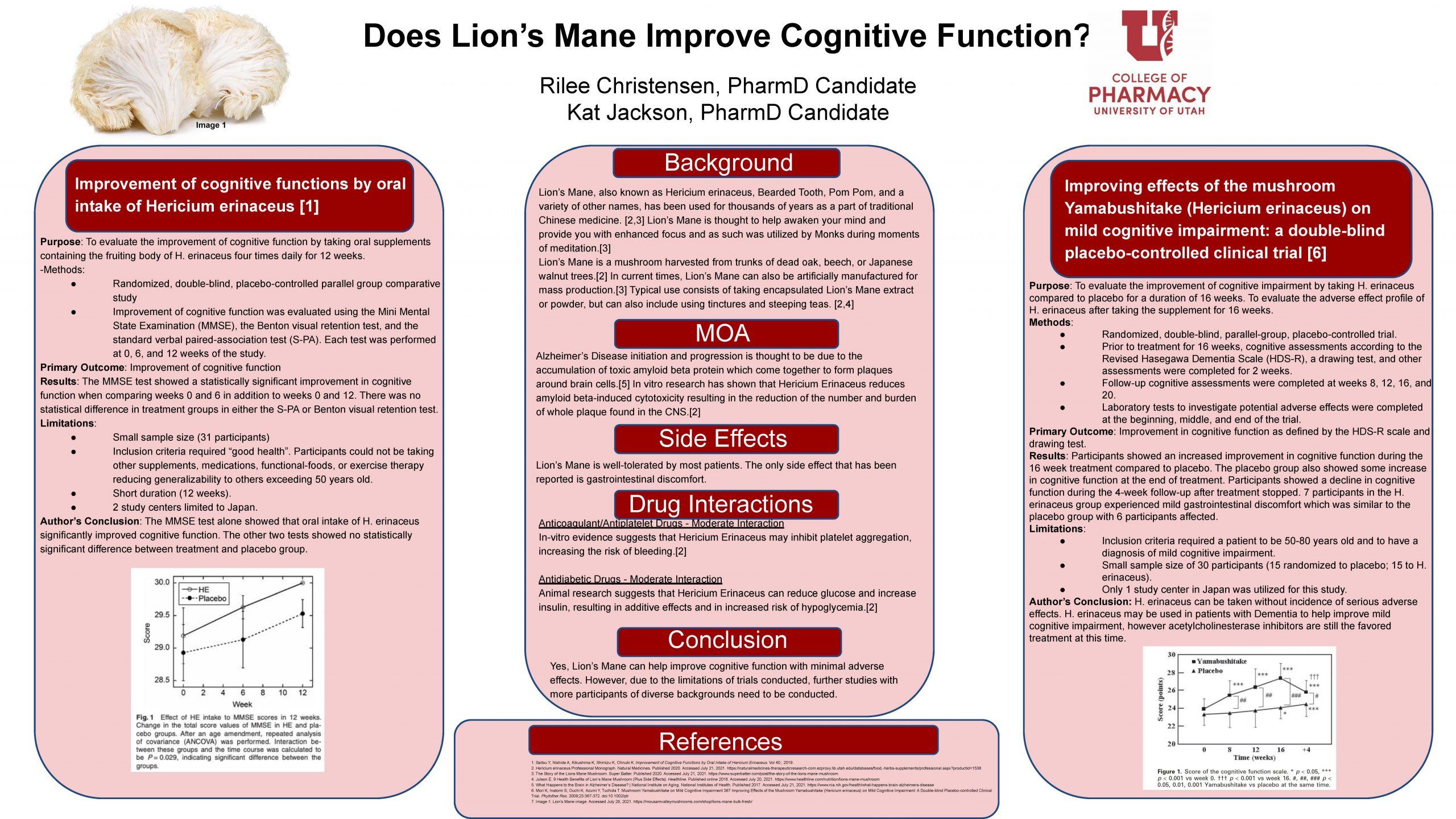Abstract: Does Lion’s Mane Improve Cognitive Function?
Kat Jackson and Rilee Christensen
Background:
Lion’s Mane, also known as Hericium erinaceus, Bearded Tooth, Pom Pom, and a variety of other names, has been used
for thousands of years as a part of traditional Chinese medicine. [1,2] Lion’s Mane is thought to help awaken your mind
and provide you with enhanced focus and as such was utilized by Monks during moments of meditation.[2]
Lion’s Mane is a mushroom harvested from trunks of dead oak, beech, or Japanese walnut trees.[1] In current times,
Lion’s Mane can also be artificially manufactured for mass production.[2] Typical use consists of taking encapsulated
Lion’s Mane extract or powder, but can also include using tinctures and steeping teas. [1,3]
Mechanism of Action:
Alzheimer’s Disease initiation and progression is thought to be due to the accumulation of toxic amyloid beta protein
which come together to form plaques around brain cells.[1] In vitro research has shown that Hericium Erinaceus reduces
amyloid beta-induced cytotoxicity resulting in the reduction of the number and burden of whole plaque found in the
CNS.[2]
Side Effects:
Lion’s Mane is well-tolerated by most patients. The only side effect that has been reported is gastrointestinal discomfort.
Drug Interactions:
Anticoagulant/Antiplatelet Drugs – Moderate Interaction: In-vitro evidence suggests that Hericium Erinaceus may inhibit
platelet aggregation, increasing the risk of bleeding.[2]
Antidiabetic Drugs – Moderate Interaction: Animal research suggests that Hericium Erinaceus can reduce glucose and
increase insulin, resulting in additive effects and in increased risk of hypoglycemia.[2]
Clinical Studies:
Saitsu et al. conducted a randomized, double-blind, placebo-controlled trial in which cognitive impairment while using H.
erinaceus for 12 weeks was assessed among participants.[4] Inclusion criteria included requiring “good health” and no
concurrent use of other supplements, medications, or functional-foods. The primary outcome was improvement of
cognitive impairment assessed at 0, 6, and 12 weeks by using the Mini Mental State Examination (MMSE), the Benton
visual retention test, and the standard verbal paired-association test (S-PA). The MMSE test showed a statistically
significant improvement in cognitive function when comparing weeks 0 and 6 in addition to weeks 0 and 12. There was no
statistically significant difference between treatment and placebo groups in either the S-PA or Benton visual retention test.
The authors concluded that the MMSE test alone showed that oral intake of H. erinaceus significantly improved cognitive
function. However, limitations of this study include a small sample size of 31 participants, strict inclusion criteria, a short
duration of 12 weeks, and only utilizing two study centers in Japan.
Mori et al. conducted a randomized, double-blind, placebo-controlled trial in which cognitive impairment and adverse
effect profile of H. erinaceus was evaluated among participants who took the supplement for 16 weeks.[5] Inclusion
criteria included those with a diagnosis of mild cognitive impairment between the ages of 50-80. The primary outcome was
improvement in cognitive function at 8, 12, 16, and 20 weeks defined by the Revised Hasegawa Dementia Scale (HDS-R)
and drawing test. The participants in the H. erinaceus group showed an increased improvement in cognitive function
during the 16 week treatment compared to placebo with 10 participants having a 3-point or more increase in their HDS-R
score. However, the placebo group also showed some increase in cognitive function at the end of treatment with 1
participant having a 3-point or more increase in their HDS-R score. Participants showed a decline in cognitive function
during the 4-week follow-up after treatment stopped. No significant adverse effects were reported with 7 participants in the
H. erinaceus group experiencing mild gastrointestinal discomfort which was similar to the placebo group with 6
participants affected. The authors concluded that H. erinaceus can be taken with no incidence of serious adverse effects
and may be used in patients with Dementia to help improve mild cognitive impairment, however acetylcholinesterase
inhibitors are still the favored therapeutic treatment. Limitations of this study include a small sample size of 30
participants, strict inclusion criteria, and utilization of only one study center.
Conclusions:
Randomized controlled trials demonstrate that Lion’s Mane can help to improve cognitive function with minimal to no
adverse effects.[4,5] However, due to the many limitations of these studies, such as small sample size, lack of external
validity, and limited study sites, further studies with more participants of diverse backgrounds need to be conducted. At
this time, acetylcholinesterase inhibitors are still the recommended therapeutic regimen for patients with cognitive
impairment.[5]
References
1. Hericium erinaceus Professional Monograph. Natural Medicines. Published 2020. Accessed July 21, 2021.
https://naturalmedicines-therapeuticresearch-com.ezproxy.lib.utah.edu/databases/food,-herbssupplements/
professional.aspx?productid=1536
2. The Story of the Lions Mane Mushroom. Super Batter. Published 2020. Accessed July 21, 2021.
https://www.superbatter.com/post/the-story-of-the-lions-mane-mushroom
3. Julson E. 9 Health Benefits of Lion’s Mane Mushroom (Plus Side Effects). Healthline. Published online 2018.
Accessed July 21, 2021. https://www.healthline.com/nutrition/lions-mane-mushroom
4. Saitsu Y, Nishide A, Kikushima K, Shimizu K, Ohnuki K. Improvement of Cognitive Functions by Oral Intake of
Hericium Erinaceus. Vol 40.; 2019.
5. Mori K, Inatomi S, Ouchi K, Azumi Y, Tuchida T. Mushroom Yamabushitake on Mild Cognitive Impairment 367
Improving Effects of the Mushroom Yamabushitake (Hericium erinaceus) on Mild Cognitive Impairment: A
Double-blind Placebo-controlled Clinical Trial. Phytother Res. 2009;23:367-372. doi:10.1002/ptr
6. What Happens to the Brain in Alzheimer’s Disease? | National Institute on Aging. National Institutes of Health.
Published 2017. Accessed July 21, 2021. https://www.nia.nih.gov/health/what-happens-brain-alzheimers-disease
Recommend0 recommendationsPublished in College of Pharmacy, Virtual Poster Session Spring 2021



Responses
Hello Rilee and Kat – what are the two main things you learned from preparing and developing this topic?
Hi Dr. Shane-McWhorter, thanks for the question. One of the main things I learned while creating this poster was that the data is lacking overall. Each study only had approximately 30 participants, reducing the power and increasing the margin of error. These limitations make it difficult to assess its overall efficacy and apply the study results to our patients. Another interesting thing I learned is that lion’s mane is found on the trunks of decaying trees. I would have never thought to use a fungus from a dead tree to improve cognitive function!
Hi Dr. Shane-McWhorter!
One of the biggest takeaways I took from preparing our poster is how relatively few side effects Lion’s Mane has, with only mild GI effects reported on Natural Medicines and in both of the studies we looked at. I am wondering if it is because Lion’s Mane potentially acts more as a functional food with it being edible. I was thinking this could also be due to the relatively few amount of low-powered studies available.
Another takeaway I took from creating our poster has to do with the drug-supplement interactions. I feel like a lot of the herbal supplements we have looked at in class so far interact with anti-platelet/anti-coagulant medications and this is no different with Lion’s Mane. It has taught me that in practice as a pharmacist, we need to take extra precautions with patients who are on anti-platelet/anti-coagulant medications and potentially counsel them on the importance of asking their pharmacist or doctor prior to starting any new herbal supplements.
Nice poster. In the first study what were the pre and post treatment MMSE scores? In the second study what were the drawing tests used? What would you say to a person on apixiban who wanted to take this product?
In the first study, the Lion’s Mane group pre-treatment MMSE score was 29.19, and the post-treatment score was 30.0. The placebo group pre-treatment MMSE score was 28.73, and the post-treatment score was 29.53. To put their results into perspective, the MMSE score ranges from 0-30, and patients with an MMSE score <24 are referred for evaluation of Alzheimer's Disease.
Regarding the second study, the drawing tests required the participants to draw the numbers on a 3mm circle clock. If the participants got all of the numbers to the clock in the correct order, they got 2 points added to their overall cognitive function score from the HDS-R test.
We would strongly recommend against taking apixaban with lion's mane due to the potential interaction resulting in an increased risk of bleeding. If a patient were adamant about taking lion's mane, we would counsel on signs of bleeding, including light-headedness, dark tarry stool, and blood in the urine.
-Rilee and Kat
Awesome poster Rilee and Kat! It looks like your both put a lot of effort into this topic. Did you find that there has been a lot of research within this supplement in relation to cognition or is this a fairly recent discovery?
Hi Vanessa! Great question. From researching Lion’s Mane, it does not appear that many studies have been conducted looking at Lion’s Mane for cognitive function. In addition, the studies that have been conducted are relatively low-powered with a very small amount of participants in a small geographic region. That being said, Lion’s Mane has been used to improve cognitive function for thousands of years. I definitely think it is an area that needs to be researched at a greater capacity because some of the results are hopeful!
Nice poster – with evidence summaries that are informative. Given the evidence you have reviewed, when would recommend a patient to start taking the product? Before symptoms of cognitive decline appear? Alternatively, is there any evidence that suggests when one should consider stopping due to the lack of an effect?
Hi Dr. Malone,
Thank you for the thoughtful questions! If a patient showed interest in starting Lion’s Mane, we would recommend they start taking the supplement prior to showing symptoms of cognitive function decline. In addition, we were unable to find research that suggests stopping the supplement due to a lack of an effect. However, the study by Mori et al. demonstrated that if this supplement is stopped, patients are likely to see an increase in their cognitive impairment with a potential return to baseline in their cognitive function. Long-term studies on Lion’s Mane safety and efficacy have not been established. The longest study conducted was only 16 weeks long, so more research in this area needed to address the length of use.
-Rilee and Kat
Hello Rilee and Kat!
From your research, were there any other benefits from Lion’s Mane that you found that would cause a patient to want to take it aside from cognitive function?
Hi Ryley! Thanks for the question.
Lion’s Mane has also been used for gastritis. One study involving patients with chronic atrophic gastritis showed an improvement in upper abdominal pain and dysplasia while reducing inflammatory infiltration. This information is based on a preliminary report and the full study details are not available at this time. More evidence is needed to assess the overall efficacy of lion’s mane in the treatment of gastritis before I would recommend it to a patient.
Hi Rilee and Kat
Interesting topic! I wonder how the potency was assessed for these products? I agree that more study would be needed. I thought the MOA was very interesting and maybe with more research this ingredient will play more of a role in dementia management. Your description of how the mushroom is utilized from a dosage formulation standpoint was very helpful. Nice work! Thank you for sharing your expertise on this topic!
Hi Dr. Orlando, thank you for your kind words and question! It does not appear that our included studies assessed potency in these products. Saitsu et al. mentioned that the dose of the mushroom’s fruiting body was 0.8 g four times daily. Mori et al. stated that the concentration of the mushroom in each dose was 96%. Overall, it appears that there has not been a method developed to test for the potency of Lion’s Mane as it is still unclear which active ingredient contributes to its effects.
Comments are closed.